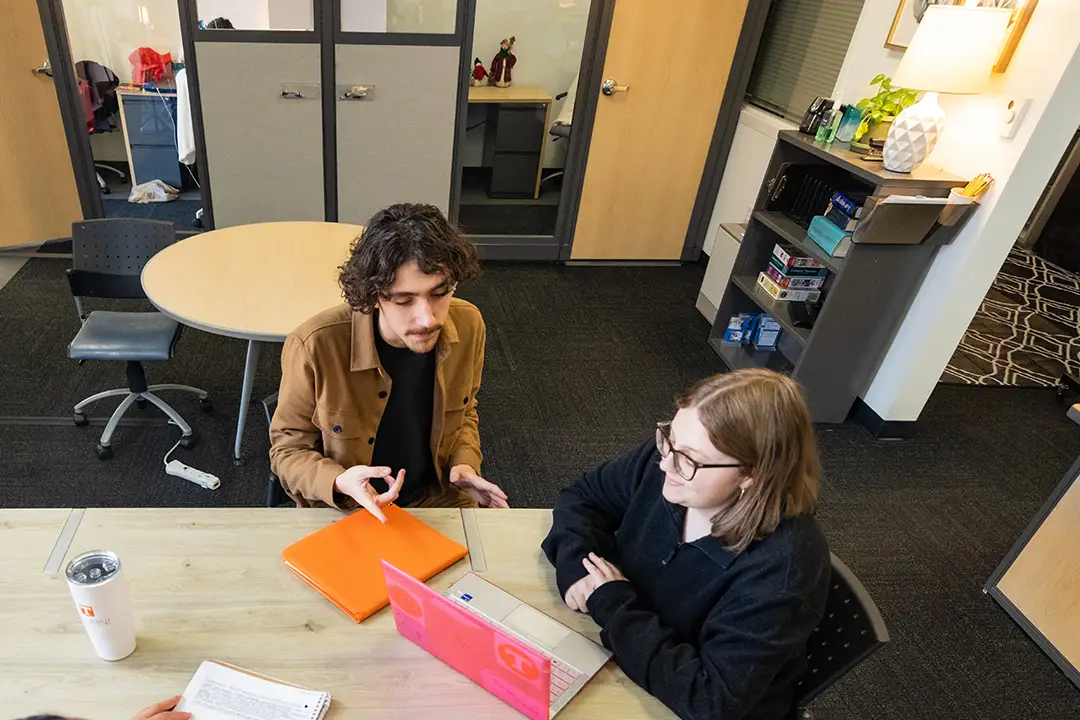College-Wide: Judith Anderson Herbert Writing Center

Herbert Writing Center grows opportunities for helping Vols across campus develop professional writing skills.
The Judith Anderson Herbert Writing Center expanded its student-focused mission this fall thanks to ongoing engagement from the Herbert family and a new status as a college-level center for comprehensive, cross-disciplinary writing support for Vols at all academic levels.
The center has long served as a valuable resource for first-year students in writing-intensive courses, with outreach in recent years to the greater Tennessee community through the Flagship Writing Project, which offers tutoring for regional high school students to improve their college-entrance essays.
The new, wider focus helps students across the UT campus develop adaptable writing skills applicable to different contexts and audiences. It offers support for both undergraduates and graduate students for writing in numerous career fields and emphasizes human-produced writing intelligence in a time of increased influence of AI writing tools.
“This change helps us to more closely align our mission with the college’s and university’s overall missions to support student writers,” said Kirsten Benson, longtime director of the center. “It amplifies that writing is important to students across disciplines. These are times when the value of human-produced writing and communication needs to be recognized for its role in learning, critical thinking, and problem solving.”
Benson is now the executive director for the center, with Kathryn Powell, who served as associate director and writing consultant coordinator since 2021, taking on the newly created position of managing director. This enhanced leadership structure is possible thanks to a new gift from the Herbert family, a continuation of the family’s 2018 support that inspired the naming of the center for Judith Anderson Herbert.
“The Herbert gift that we received in 2018 allowed us to expand a lot of the things that we do,” said Benson. “What we have found since then is that, in trying to reach out to more of the campus and serve more students, there’s less time for stepping back and doing the visioning, goal setting, and larger strategic planning types of things, because we’re just so busy. So, this change grows out of really great things, and adding to the structure will make it possible to do more of those things.”
Strategically Supporting Students and Faculty

Through expanded outreach and student-engagement opportunities, the center’s team looks to help students build upon their writing intelligence, including developing greater AI literacy to use AI tools productively, effectively, and ethically.
“We want to provide a greater variety of resources for writing support for students across all disciplines,” said Benson. “We look for more ways to staff our appointment schedules and our satellite locations across campus, making it easier for students to talk in person or online with our writing consultants.”
The center is also expanding outreach to faculty who teach writing-focused courses across all disciplines. This includes expanding faculty workshops, which have seen a 90% participation increase since the first Herbert gift.
“As a college-wide center, we’ll have greater ability to connect with faculty and support their teaching with writing,” said Benson. “We envision establishing a faculty advisory board to discuss writing-related needs and policies. We also want to explore the possibilities for a writing fellows program, with specialist writing consultants available to some writing-intensive courses.”
The new structure helps the center expand capacity for related research, including writing self-efficacy, engagement with reading and writing, and the effectiveness of existing and innovative approaches to writing support.
Continued Outreach to Young Tennessee Writers
The center’s enhanced structure and scope will also allow more opportunities to grow the Flagship Writing Project, helping Tennessee high school students achieve greater access to higher education.
“By attracting more undergraduates and faculty who are interested in contributing, we hope to expand the types of writing we can support and ultimately help more high school writers feel capable of writing at the level required for college success,” said Benson.
This outreach connects the center’s work directly with the university’s land grant mission to make life and lives better for Tennesseans. The enhanced connections across campus and the greater Big Orange community mark a full circle of support from college leadership and the generous engagement of the center’s namesake alumni family.
“We’re immensely grateful to the Herbert family for their new gift that is making this possible,” said Benson. “For their continued belief in our mission, and their trust that we will work hard to implement it.”
By Randall Brown